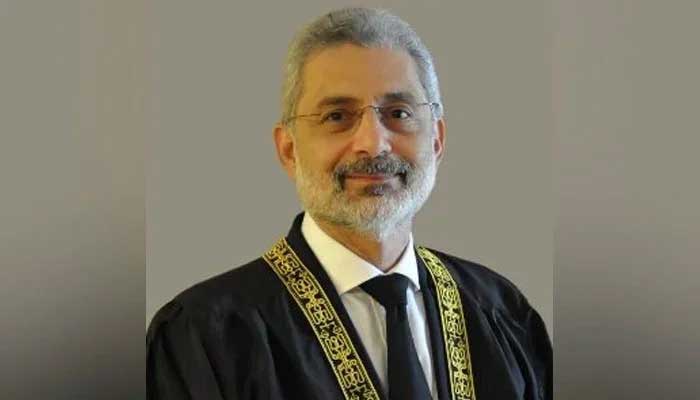Suo motu powers belong to Supreme Court, says Justice Faez Isa
Top court judge says Article 184(3) that gives right to take suo motu is for public interest and enforcement of fundamental rights
Justice Qazi Faiz Isa, one of the senior judges of the Supreme Court, said on Wednesday that the authority to take a suo motu under the provisions of Article 184(3) of the Constitution, lies with the apex court while his "friends" think that only the chief justice can use this authority.
While addressing a ceremony at the Constitution of Pakistan's Golden Jubilee in Islamabad, the senior puisne judge said that Article 184(3) was for the public interest and enforcement of fundamental rights.
"The clause of Article 184(3) was added in the Constitution for the oppressed but was used extensively for both good and bad reasons and one should be vigilant while using it," said Justice Isa while addressing a ceremony organised in connection with the Constitution of Pakistan's Golden Jubilee in Islamabad.
Justice Isa said that the authority to take a suo motu under provisions of Article 184(3) of the Constitution lies with the apex court. "My friends are of the view that the [sou motu] powers can only be exercised by the chief justice of Pakistan," he added.
Justice Isa asked for the clause that made the chief justice master of rules so he could correct himself. He added that the third opinion was that all the judges and the Chief Justice of Pakistan (CJP) must unite under Article 184(3).
According to the senior-most judge, every case whether criminal or civil has at least one right to appeal but this is not the case under Article 184-3.
“Whenever there is injustice, it doesn’t last long,” Justice Isa said.
Referring to the secession of East Pakistan, the justice said that the country did not split all of a sudden as the seeds of [bifurcation] were sown”. He said that the main reason for the division of Pakistan was a wrong judicial decision.
“The Constitution has not presented the way it deserves to be,” Justice Isa said, adding that whatever has been made of the Constitution should be understood. He said "Many senior lawyers don't love the Constitution as they only care about the money".
He said that the idea of establishing Pakistan was to have a country free from the exploitation of Muslims where they could live as they wished. He said that the biggest Muslim state in the world came into existence but the job was left half done.
Justice Isa said that the “legislative assembly worked for seven years”.
“When the Constitution reached the brink of completion, Ghulam Muhammad, a civil servant, stumbled on the Constitution,” he said.
Justice Isa regretted that there had been no elections in the legislative assembly of 1956 which ended within two years.
“A civil servant concluded that he was a wise man’ and there came the martial law of 1958,” the justice said, adding that this “wise man” formed the 1962 Constitution on his own and ended the democracy.
“According to the civil servant, the people are not conscious have no intelligence, so there should be a filter. This wise man introduced basic democracy for the filter,” Justice Isa said.
Under this basic democracy, 80,000 elected representatives should choose the president and control the people with him, he added.
The senior puisne judge said that Justice Munir planted the seed of the separation of Pakistan.
“This poisonous seed grew and in December 1971 the country was divided into two parts," Justice Isa said.
He said that the effects of actions taken today would manifest years and centuries later.
“They issue different kinds of orders, I don't know who they are fooling,” Justice Isa said.
Referring to the constitutional amendment of Article 58(2B), the justice said that it had been introduced to dissolve the elected parliament whenever they want. Under the 18th Amendment, 58(2B) was abolished and gave rights to the provinces, said the judge.
He said that the 18th Amendment removed all the errors that had marred the Constitution of 73.
“The 18th Amendment strengthened the federation and gave powers to the provinces,” he said, adding that 17 ministries had been abolished under the amendment.
Speaking about the 50th anniversary of the Constitution, Justice Isa said that it (the Constitution) was for the people of Pakistan who have their rights in it. "This document is of every single citizen," added the SC judge.
He said that Pakistan needed a Constitution after becoming an independent state. "Pakistan separated mainly because of a wrong judicial decision," he highlighted.
Justice Isa said that a decision would still be wrong even if it was decided by a majority. "There are differences of opinion in a society and if everyone starts to support one thing then it would become a dictatorship."
The senior puisne judge said that the worst thing was arrogance followed by ego and one should not have an ego if they were sitting in some position [of power].
"The day I become egoistic, I will not be a judge," said Justice Isa, adding that dissent had nothing to do with ego.
Justice Isa said, "We have a responsibility to uphold the Constitution as it is a gift and can never be found again".
"Those who do not follow the Constitution do not need to live in Pakistan and the Constitution also applies to foreigners residing in Pakistan," he added.
-
Security forces gun down 30 terrorists in multiple IBOs in KP: ISPR
-
MQM-P calls for new province in Sindh
-
US report validates Pakistan military edge over India: PM
-
Banned TTP poses serious threat to Pakistan security: UNSC panel
-
CM Afridi clarifies remarks on by-poll after ECP requests army deployment
-
Dubai sees 3.2m Pakistani passengers in 2025 as airport sets new milestone
-
Security forces kill 23 Indian proxy terrorists in KP's Kurram
-
Pakistan to construct island to boost oil exploration: report












